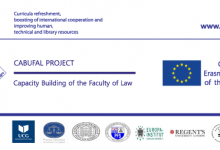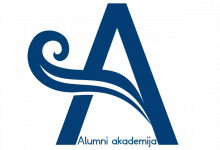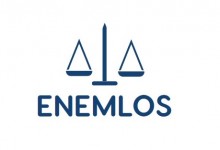Pravni fakultet / Pravne nauke, smjer Ustavno pravno-politički / UPRAVNO SUDSKI POSTUPAK
| Naziv predmeta: | UPRAVNO SUDSKI POSTUPAK |
| Šifra predmeta | Status predmeta | Semestar | Broj ECTS kredita | Fond časova (P+V+L) |
| 5243 | Izborni | 1 | 4 | 2+0+0 |
| Studijski programi za koje se organizuje | Pravne nauke, smjer Ustavno pravno-politički |
| Uslovljenost drugim predmetima | |
| Ciljevi izučavanja predmeta | |
| Ishodi učenja | Nakon što student položi ovaj ispit biće u mogućnosti da: objasni logiku rada i specifičnosti Upravnog suda; objasni principe rada i ovlašćenja Upravnog suda; pravilno tumači propise koji regulišu njegov rad; objasni logiku i redoslijed pravnih procedura koje prethode upravno sudskom postupku i posebno da razumije upravno sudske procedure; razumije posljedice donesenih presuda u upravnim sporovima i proceduru zbog neizvršenja presuda, donesenih od strane Upravnog suda; shvati logiku i zna vrste pravnih sredstava u vezi sa upravnim sporom. |
| Ime i prezime nastavnika i saradnika | |
| Metod nastave i savladanja gradiva |
| Plan i program rada |
|
Pripremne nedjelje - priprema i upis semestra I nedjelja, pred. - I nedjelja, vježbe - II nedjelja, pred.- II nedjelja, vježbe III nedjelja, pred.- III nedjelja, vježbe - IV nedjelja, pred.- IV nedjelja, vježbe - V nedjelja, pred.- V nedjelja, vježbe - VI nedjelja, pred.- VI nedjelja, vježbe - VII nedjelja, pred.- VII nedjelja, vježbe - VIII nedjelja, pred.- VIII nedjelja, vježbe - IX nedjelja, pred.- IX nedjelja, vježbe - X nedjelja, pred.- X nedjelja, vježbe - XI nedjelja, pred.- XI nedjelja, vježbe - XII nedjelja, pred.- XII nedjelja, vježbe - XIII nedjelja, pred.- XIII nedjelja, vježbe - XIV nedjelja, pred.- XIV nedjelja, vježbe - XV nedjelja, pred.- XV nedjelja, vježbe - |
| Opterećenje studenta | |
| Nedjeljno | U toku semestra |
| 4 kredita x 40/30=5 sati i 20 minuta
2 sat(a) teorijskog predavanja 0 sat(a) praktičnog predavanja 0 vježbi 3 sat(a) i 20 minuta samostalnog rada, uključujući i konsultacije |
Nastava i završni ispit:
5 sati i 20 minuta x 16 =85 sati i 20 minuta Neophodna priprema prije početka semestra (administracija, upis, ovjera): 5 sati i 20 minuta x 2 =10 sati i 40 minuta Ukupno opterećenje za predmet: 4 x 30=120 sati Dopunski rad za pripremu ispita u popravnom ispitnom roku, uključujući i polaganje popravnog ispita od 0 do 30 sati (preostalo vrijeme od prve dvije stavke do ukupnog opterećenja za predmet) 24 sati i 0 minuta Struktura opterećenja: 85 sati i 20 minuta (nastava), 10 sati i 40 minuta (priprema), 24 sati i 0 minuta (dopunski rad) |
| Obaveze studenta u toku nastave | |
| Konsultacije | |
| Literatura | |
| Oblici provjere znanja i ocjenjivanje | |
| Posebne naznake za predmet | |
| Napomena |
| Ocjena: | F | E | D | C | B | A |
| Broj poena | manje od 50 poena | više ili jednako 50 poena i manje od 60 poena | više ili jednako 60 poena i manje od 70 poena | više ili jednako 70 poena i manje od 80 poena | više ili jednako 80 poena i manje od 90 poena | više ili jednako 90 poena |
Pravni fakultet / Pravne nauke, smjer Ustavno pravno-politički / VIKTIMOLOGIJA
| Naziv predmeta: | VIKTIMOLOGIJA |
| Šifra predmeta | Status predmeta | Semestar | Broj ECTS kredita | Fond časova (P+V+L) |
| 5258 | Izborni | 1 | 4 | 2+0+0 |
| Studijski programi za koje se organizuje | Pravne nauke, smjer Ustavno pravno-politički |
| Uslovljenost drugim predmetima | |
| Ciljevi izučavanja predmeta | |
| Ishodi učenja | Nakon što student položi ovaj ispit biće u mogućnosti da: definiše viktimološku dimenziju kriminalne pojave; objasni pojam žrtve krivičnog djela; razlikuje tipologije žrtava kriminaliteta; protumači viktimizaciju i rizik viktimizacije; analizira viktimogene predispozicije; priprema, organizuje i razvija prevenciju viktimizacije. |
| Ime i prezime nastavnika i saradnika | |
| Metod nastave i savladanja gradiva |
| Plan i program rada |
|
Pripremne nedjelje - priprema i upis semestra I nedjelja, pred. - I nedjelja, vježbe - II nedjelja, pred.- II nedjelja, vježbe III nedjelja, pred.- III nedjelja, vježbe - IV nedjelja, pred.- IV nedjelja, vježbe - V nedjelja, pred.- V nedjelja, vježbe - VI nedjelja, pred.- VI nedjelja, vježbe - VII nedjelja, pred.- VII nedjelja, vježbe - VIII nedjelja, pred.- VIII nedjelja, vježbe - IX nedjelja, pred.- IX nedjelja, vježbe - X nedjelja, pred.- X nedjelja, vježbe - XI nedjelja, pred.- XI nedjelja, vježbe - XII nedjelja, pred.- XII nedjelja, vježbe - XIII nedjelja, pred.- XIII nedjelja, vježbe - XIV nedjelja, pred.- XIV nedjelja, vježbe - XV nedjelja, pred.- XV nedjelja, vježbe - |
| Opterećenje studenta | |
| Nedjeljno | U toku semestra |
| 4 kredita x 40/30=5 sati i 20 minuta
2 sat(a) teorijskog predavanja 0 sat(a) praktičnog predavanja 0 vježbi 3 sat(a) i 20 minuta samostalnog rada, uključujući i konsultacije |
Nastava i završni ispit:
5 sati i 20 minuta x 16 =85 sati i 20 minuta Neophodna priprema prije početka semestra (administracija, upis, ovjera): 5 sati i 20 minuta x 2 =10 sati i 40 minuta Ukupno opterećenje za predmet: 4 x 30=120 sati Dopunski rad za pripremu ispita u popravnom ispitnom roku, uključujući i polaganje popravnog ispita od 0 do 30 sati (preostalo vrijeme od prve dvije stavke do ukupnog opterećenja za predmet) 24 sati i 0 minuta Struktura opterećenja: 85 sati i 20 minuta (nastava), 10 sati i 40 minuta (priprema), 24 sati i 0 minuta (dopunski rad) |
| Obaveze studenta u toku nastave | |
| Konsultacije | |
| Literatura | |
| Oblici provjere znanja i ocjenjivanje | |
| Posebne naznake za predmet | |
| Napomena |
| Ocjena: | F | E | D | C | B | A |
| Broj poena | manje od 50 poena | više ili jednako 50 poena i manje od 60 poena | više ili jednako 60 poena i manje od 70 poena | više ili jednako 70 poena i manje od 80 poena | više ili jednako 80 poena i manje od 90 poena | više ili jednako 90 poena |
Pravni fakultet / Pravne nauke, smjer Ustavno pravno-politički / MEĐUNARODNO KRIVIČNO PRAVO
| Naziv predmeta: | MEĐUNARODNO KRIVIČNO PRAVO |
| Šifra predmeta | Status predmeta | Semestar | Broj ECTS kredita | Fond časova (P+V+L) |
| 5223 | Obavezan | 1 | 8 | 2+1+1 |
| Studijski programi za koje se organizuje | Pravne nauke, smjer Ustavno pravno-politički |
| Uslovljenost drugim predmetima | |
| Ciljevi izučavanja predmeta | |
| Ishodi učenja | |
| Ime i prezime nastavnika i saradnika | |
| Metod nastave i savladanja gradiva |
| Plan i program rada |
|
Pripremne nedjelje - priprema i upis semestra I nedjelja, pred. - I nedjelja, vježbe - II nedjelja, pred.- II nedjelja, vježbe III nedjelja, pred.- III nedjelja, vježbe - IV nedjelja, pred.- IV nedjelja, vježbe - V nedjelja, pred.- V nedjelja, vježbe - VI nedjelja, pred.- VI nedjelja, vježbe - VII nedjelja, pred.- VII nedjelja, vježbe - VIII nedjelja, pred.- VIII nedjelja, vježbe - IX nedjelja, pred.- IX nedjelja, vježbe - X nedjelja, pred.- X nedjelja, vježbe - XI nedjelja, pred.- XI nedjelja, vježbe - XII nedjelja, pred.- XII nedjelja, vježbe - XIII nedjelja, pred.- XIII nedjelja, vježbe - XIV nedjelja, pred.- XIV nedjelja, vježbe - XV nedjelja, pred.- XV nedjelja, vježbe - |
| Opterećenje studenta | |
| Nedjeljno | U toku semestra |
| 8 kredita x 40/30=10 sati i 40 minuta
2 sat(a) teorijskog predavanja 1 sat(a) praktičnog predavanja 1 vježbi 6 sat(a) i 40 minuta samostalnog rada, uključujući i konsultacije |
Nastava i završni ispit:
10 sati i 40 minuta x 16 =170 sati i 40 minuta Neophodna priprema prije početka semestra (administracija, upis, ovjera): 10 sati i 40 minuta x 2 =21 sati i 20 minuta Ukupno opterećenje za predmet: 8 x 30=240 sati Dopunski rad za pripremu ispita u popravnom ispitnom roku, uključujući i polaganje popravnog ispita od 0 do 30 sati (preostalo vrijeme od prve dvije stavke do ukupnog opterećenja za predmet) 48 sati i 0 minuta Struktura opterećenja: 170 sati i 40 minuta (nastava), 21 sati i 20 minuta (priprema), 48 sati i 0 minuta (dopunski rad) |
| Obaveze studenta u toku nastave | |
| Konsultacije | |
| Literatura | |
| Oblici provjere znanja i ocjenjivanje | |
| Posebne naznake za predmet | |
| Napomena |
| Ocjena: | F | E | D | C | B | A |
| Broj poena | manje od 50 poena | više ili jednako 50 poena i manje od 60 poena | više ili jednako 60 poena i manje od 70 poena | više ili jednako 70 poena i manje od 80 poena | više ili jednako 80 poena i manje od 90 poena | više ili jednako 90 poena |
Pravni fakultet / Pravne nauke, smjer Ustavno pravno-politički / KRIMINOLOGIJA
| Naziv predmeta: | KRIMINOLOGIJA |
| Šifra predmeta | Status predmeta | Semestar | Broj ECTS kredita | Fond časova (P+V+L) |
| 5253 | Obavezan | 1 | 8 | 2+1+1 |
| Studijski programi za koje se organizuje | Pravne nauke, smjer Ustavno pravno-politički |
| Uslovljenost drugim predmetima | Nema uslova za prijavljivanje i slušanje predmeta |
| Ciljevi izučavanja predmeta | Predmet ima za cilj edukaciju studenata iz oblasti KRIMINOLOLOŠKE nauke u svrhu implementacije naučnih saznanja u praksi. |
| Ishodi učenja | Nakon što student položi ovaj ispit biće osposobljen da: definiše kriminološke discipline i kriminalitet prema konotaciji i obimu; protumači kriminološku etiologiju i fenomenologiju; analizira faktore zločina i kriminaliteta i pojavne oblike kriminalnih ispoljavanja; utvrdi kriterijume za klasifikaciju i tipologiju kriminaliteta i priprema strategije suprotstavljanja kriminalitetu; organizuje kriminološka istraživanja krivičnih djela i njihovih počinilaca koristeći metode proučavanja kriminaliteta kao individualbne pojave i metode proučavanja kriminaliteta u totalitetu; primjenjuje kriminološka saznanja u praksi u cilju efikasnog suzbijanja i sprječavanja kriminaliteta. |
| Ime i prezime nastavnika i saradnika | Prof. dr Velimr Rakočević |
| Metod nastave i savladanja gradiva | Predavanja, vježbe, seminarski radovi, konsultacije |
| Plan i program rada |
|
Pripremne nedjelje - priprema i upis semestra I nedjelja, pred. - Pojam kriminologije, predmet kriminologije, odnos kriminologije i drugih naučnih disciplina, I nedjelja, vježbe - II nedjelja, pred.-Metodi kriminologije ( proučavanje individualnih slučajeva kriminalnog ponašanja, klinički metod, anamnestički metod, dokumentaciona i analiza sadržaja, tehnike koje se primjenjuju u proučavanju kriminalnog ponašanja kao pojedinačne pojave , II nedjelja, vježbe III nedjelja, pred.- Metodi i tehnike saznavanja kriminaliteta kao masovne društvene pojave, faze kriminološkog istraživanja, prikupljanje činjenica III nedjelja, vježbe - IV nedjelja, pred.- Primjena statistike u kriminologiji ( metod korelacije, statističke evidencije kriminaliteta, tehnike prikupljanja podataka o stvarnom kriminalitetu, statistička analiza dobijenih podataka) IV nedjelja, vježbe - V nedjelja, pred.- Metodi prognoziranja kriminaliteta V nedjelja, vježbe - VI nedjelja, pred.- Kriminološko nasljeđe VI nedjelja, vježbe - VII nedjelja, pred.- Početak formiranja kriminologije kao nauke VII nedjelja, vježbe - VIII nedjelja, pred.- Klasična orijentacija u kriminologiji, Savremeni neoklasicizam, Desni realizam VIII nedjelja, vježbe - IX nedjelja, pred.- Pozitivistička orijentacija u kriminologiji, Kartografska škola, Antropološka škola, biološka shvatanja, psihološka shvatanja, IX nedjelja, vježbe - X nedjelja, pred.- Ekološka teorija, Teorija o učenju, Teorija kulturnog konflikta i raskoraka, Teorije društvenog pritiska, Kontrolne teorije, novije sociološke teorije X nedjelja, vježbe - XI nedjelja, pred.- Fenomenološka dimenzija kriminalne pojave, obim , dinamika i struktura kriminaliteta, struktura kriminaliteta prema polu, regionalne karakteristike kriminaliteta, sezonske i vremenske varijacije kriminaliteta. XI nedjelja, vježbe - XII nedjelja, pred.- Tipologije kriminaliteta, XII nedjelja, vježbe - XIII nedjelja, pred.- Klasični kriminalitet XIII nedjelja, vježbe - XIV nedjelja, pred.- Novi oblici kriminaliteta :organizovani kriminalitet, pranje novca, sajber kriminalitet ekološki kriminalitet i sl. Endogeni faktori kriminaliteta XIV nedjelja, vježbe - XV nedjelja, pred.- Endogeni i egzogeni faktori zločina XV nedjelja, vježbe - |
| Opterećenje studenta | Nastava i završni ispit: (10 sati 40 minuta) x 16 = 170 sati 40 minuta Neophodne pripreme (administracija, upis, ovjera prije početka semestra): 2x (10 sati i 40 minuta) = 21 sat i 20 minuta Ukupno opterećenje za predmet: 8x30 = 240 sati |
| Nedjeljno | U toku semestra |
| 8 kredita x 40/30=10 sati i 40 minuta
2 sat(a) teorijskog predavanja 1 sat(a) praktičnog predavanja 1 vježbi 6 sat(a) i 40 minuta samostalnog rada, uključujući i konsultacije |
Nastava i završni ispit:
10 sati i 40 minuta x 16 =170 sati i 40 minuta Neophodna priprema prije početka semestra (administracija, upis, ovjera): 10 sati i 40 minuta x 2 =21 sati i 20 minuta Ukupno opterećenje za predmet: 8 x 30=240 sati Dopunski rad za pripremu ispita u popravnom ispitnom roku, uključujući i polaganje popravnog ispita od 0 do 30 sati (preostalo vrijeme od prve dvije stavke do ukupnog opterećenja za predmet) 48 sati i 0 minuta Struktura opterećenja: 170 sati i 40 minuta (nastava), 21 sati i 20 minuta (priprema), 48 sati i 0 minuta (dopunski rad) |
| Obaveze studenta u toku nastave | U skladu sa pravilima UCG |
| Konsultacije | |
| Literatura | Rakočević V. (2007). Kriminologija, Podgorica |
| Oblici provjere znanja i ocjenjivanje | Nastava i završni ispit: (10 sati 40 minuta) x 16 = 170 sati 40 minuta Neophodne pripreme (administracija, upis, ovjera prije početka semestra): 2x (10 sati i 40 minuta) = 21 sat i 20 minuta Ukupno opterećenje za predmet: 8x30 = 240 sati Kolokvijum do 40 poena Aktivnosti u toku semestra do 10 poena Završni ispit do 50 poen |
| Posebne naznake za predmet | Nema |
| Napomena |
| Ocjena: | F | E | D | C | B | A |
| Broj poena | manje od 50 poena | više ili jednako 50 poena i manje od 60 poena | više ili jednako 60 poena i manje od 70 poena | više ili jednako 70 poena i manje od 80 poena | više ili jednako 80 poena i manje od 90 poena | više ili jednako 90 poena |
Pravni fakultet / Pravne nauke, smjer Ustavno pravno-politički / KRIVIČNO PRAVNE KLINIKE
| Naziv predmeta: | KRIVIČNO PRAVNE KLINIKE |
| Šifra predmeta | Status predmeta | Semestar | Broj ECTS kredita | Fond časova (P+V+L) |
| 5254 | Obavezan | 1 | 10 | 3+2+0 |
| Studijski programi za koje se organizuje | Pravne nauke, smjer Ustavno pravno-politički |
| Uslovljenost drugim predmetima | nema uslova za prijavljivanje i slušanje predmeta |
| Ciljevi izučavanja predmeta | Predmet ima za cilj edukaciju studenata iz oblasti krivično pravne prakse |
| Ishodi učenja | Nakon što student položi ovaj ispit biće u mogućnosti da: definiše i opiše pojedine institute i pojmove opšteg i posebnog dijela krivičnog prava; razlikuje pojmove i institute opšteg i posebnog dijela krivičnog prava i njihovu međusobnu povezanost; primjeni određene institute opšteg dijela krivičnog prava na konkretan činjenični opis događaja; analizira činjenični opis događaja iz kojeg je proistekla krivična stvar i utvrđuje postojanje elemenata određenog krivičnog djela; utvrdi postojanje uslova za primjenu i nekih drugih bitnih instituta krivičnog prava na konkretan slučaj iz prakse što je od velikog značaja za pravilnu primjenu krivičnopravnih normi. |
| Ime i prezime nastavnika i saradnika | Drago Radulović |
| Metod nastave i savladanja gradiva | Predavanja, vježbe, praksa, konsultacije |
| Plan i program rada |
|
Pripremne nedjelje - priprema i upis semestra I nedjelja, pred. - Uvod u kliniku i upoznavanje sa sudijom I nedjelja, vježbe - II nedjelja, pred.-Osposobljavanje za pribavljanje personalnih dokaza – iskaza kao dokaznog sredstva II nedjelja, vježbe III nedjelja, pred.- Osposobljavanje za saslušanje, unakrsno ispitivanje III nedjelja, vježbe - IV nedjelja, pred.- Uviđaj i rekonstrukcija – izrada zapisnika IV nedjelja, vježbe - V nedjelja, pred.- I kolokvijum – Simulacija V nedjelja, vježbe - VI nedjelja, pred.- Kriminalistička tehnika – praksa VI nedjelja, vježbe - VII nedjelja, pred.- Akademska (slobodna) nedelja VII nedjelja, vježbe - VIII nedjelja, pred.- Akti predhodnog postupka (zahtjev za sprovođenje istrage, optužni akti) – struktura i način izrade VIII nedjelja, vježbe - IX nedjelja, pred.- Rukovođenje postupkom, donošenje odluka - praksa IX nedjelja, vježbe - X nedjelja, pred.- Struktura i način izrade sudskih odluka – izrada akata X nedjelja, vježbe - XI nedjelja, pred.- Postupak prema maloljetnicima – struktura i način izrade akata XI nedjelja, vježbe - XII nedjelja, pred.- II kolokvijum – Simulacija XII nedjelja, vježbe - XIII nedjelja, pred.- Postupak za djela organizovanog kriminala– struktura i način izrade akata XIII nedjelja, vježbe - XIV nedjelja, pred.- Postupak pružanja međunarodno pravne pomoći– struktura i način izrade akata XIV nedjelja, vježbe - XV nedjelja, pred.- Simulacija rješavanja određenog slučaja Analiza slučajeva iz suđenja i sudske prakse XV nedjelja, vježbe - |
| Opterećenje studenta | Nedjeljno 10 kredita x 40/30 = 13 sati i 20 minuta Struktura: 3 sati predavanja 2 sati vježbi 8 sati i 20 minuta individualnog rada studenta (priprema za laboratorijske vježbe, za kolokvijume, izrada domaćih zadataka) uključujući i konsultacije U semestru Nastava i završni ispit: (13 sati i 20 minuta) x 16 = 213 sati i 20 minuta Neophodna priprema prije početka semestra (administracija, upis, ovjera): 2 x (13 sati i 20 minuta) = 26 sati i 40 minuta Ukupno opterećenje za predmet: 10 x 30 = 300 sati Dopunski rad za pripremu ispita u popravnom ispitnom roku, uključujući i polaganje popravnog ispita od 0 - 30 sati. Struktura opterećenja: 213 sati i 20 minuta (nastava) + 26 sati i 40 minuta (priprema) + 30 sati (dopunski rad) |
| Nedjeljno | U toku semestra |
| 10 kredita x 40/30=13 sati i 20 minuta
3 sat(a) teorijskog predavanja 0 sat(a) praktičnog predavanja 2 vježbi 8 sat(a) i 20 minuta samostalnog rada, uključujući i konsultacije |
Nastava i završni ispit:
13 sati i 20 minuta x 16 =213 sati i 20 minuta Neophodna priprema prije početka semestra (administracija, upis, ovjera): 13 sati i 20 minuta x 2 =26 sati i 40 minuta Ukupno opterećenje za predmet: 10 x 30=300 sati Dopunski rad za pripremu ispita u popravnom ispitnom roku, uključujući i polaganje popravnog ispita od 0 do 30 sati (preostalo vrijeme od prve dvije stavke do ukupnog opterećenja za predmet) 60 sati i 0 minuta Struktura opterećenja: 213 sati i 20 minuta (nastava), 26 sati i 40 minuta (priprema), 60 sati i 0 minuta (dopunski rad) |
| Obaveze studenta u toku nastave | Studenti su obavezni da pohađaju nastavu, učestvuju u rješavanju praktičnih zadataka. |
| Konsultacije | |
| Literatura | : Đuričin i ostali, Praktikum za pravne klinike, 2006; Radulović, Zakonik o krivičnom postupku RCG sa objašnjenjima, 2004; Grubač, praktikum za krivično procesno pravo, 1999; Danić, Praktikum za krivično procesno pravo, 2005; Knežević, Praktikum za krivično procesno pravo,2006. |
| Oblici provjere znanja i ocjenjivanje | - Prelazna ocjena se dobija ako se kumulativno obezbijedi najmanje 51 poen A- 91-100; B-81-90; C-71-80; D: 61-70; E-51-60; F- do 51 poen |
| Posebne naznake za predmet | Nema |
| Napomena |
| Ocjena: | F | E | D | C | B | A |
| Broj poena | manje od 50 poena | više ili jednako 50 poena i manje od 60 poena | više ili jednako 60 poena i manje od 70 poena | više ili jednako 70 poena i manje od 80 poena | više ili jednako 80 poena i manje od 90 poena | više ili jednako 90 poena |
Pravni fakultet / Pravne nauke, smjer Ustavno pravno-politički / MEĐUNARODNO PRAVO ZAŠTITE ŽIVOTNE SREDINE
| Naziv predmeta: | MEĐUNARODNO PRAVO ZAŠTITE ŽIVOTNE SREDINE |
| Šifra predmeta | Status predmeta | Semestar | Broj ECTS kredita | Fond časova (P+V+L) |
| 5225 | Izborni | 2 | 4 | 2++0 |
| Studijski programi za koje se organizuje | Pravne nauke, smjer Ustavno pravno-politički |
| Uslovljenost drugim predmetima | / |
| Ciljevi izučavanja predmeta | Upoznavanje studenata sa osnovnim konceptima i značajem zaštite životne sredine |
| Ishodi učenja | Nakon što student položi ovaj ispit biće u mogućnosti da: prepozna, razlikuje i objasni odnose koje reguliše MPZŽS; analizira osnovne međunarodne izvore prava; razlikuje međunarodne sudove i druge organe pred kojima se štite ova prava; prepozna i koristi postupke dostupne u nacionalnom pravu. |
| Ime i prezime nastavnika i saradnika | Prof. dr Maja Kostić-Mandić |
| Metod nastave i savladanja gradiva | Predavanja, praktični oblici nastave (studije slučaja, izlaganja studenata, diskusija, simulacije, pisanje pravnog mišljenja), konsultacije |
| Plan i program rada |
|
Pripremne nedjelje - priprema i upis semestra I nedjelja, pred. - Uvodne napomene o predmetu i literaturi, ekologija i životna sredina, značaj izučavanja međunarodne zaštite životne sredine I nedjelja, vježbe - II nedjelja, pred.-Globalni problemi u oblasti životne sredine (promjena klime, oštećenje ozonskog omotača, gubitak biodiverziteta, zagađenje voda, zemljišta, propadanje šuma, upravljanje otpadom, GMO, veliki incidenti, hemijski rizik i opasnost od zračenja) II nedjelja, vježbe III nedjelja, pred.- Međunarodni ugovori kao izvori prava. III nedjelja, vježbe - IV nedjelja, pred.- Praksa Međunarodnog suda pravde (studije slučaja) IV nedjelja, vježbe - V nedjelja, pred.- Ljudska prava i zaštita životne sredine; praksa Evropskog suda za ljudska prava (studije slučaja) V nedjelja, vježbe - VI nedjelja, pred.- Osnovni principi na kojima počiva zaštita životne sredine (princip prevencije, princip predostrožnosti, princip zagađivač plaća) (studije slučaja) VI nedjelja, vježbe - VII nedjelja, pred.- Kolokvijum VII nedjelja, vježbe - VIII nedjelja, pred.- Evropsko pravo zaštite životne sredine VIII nedjelja, vježbe - IX nedjelja, pred.- Popravni kolokvijuma IX nedjelja, vježbe - X nedjelja, pred.- Pristup informacijama, mogućnost učestvovanja javnosti u odlučivanju o životnoj sredini i pravna zaštita ovih prava X nedjelja, vježbe - XI nedjelja, pred.- Procjena uticaja na životnu sredinu i strateška procjena uticaja na životnu sredinu XI nedjelja, vježbe - XII nedjelja, pred.- Prekogranično zagađenje XII nedjelja, vježbe - XIII nedjelja, pred.- Pravna sredstva dostupna pred nacionalnim pravosuđem (studije slučaja) XIII nedjelja, vježbe - XIV nedjelja, pred.- Simulacija suđenja (hipotetički slučaj o izgradnji objekta na jezeru koje se nalazi u tri zemlje) XIV nedjelja, vježbe - XV nedjelja, pred.- Pisanje pravnog mišljenja na zadatu temu XV nedjelja, vježbe - |
| Opterećenje studenta | |
| Nedjeljno | U toku semestra |
| 4 kredita x 40/30=5 sati i 20 minuta
2 sat(a) teorijskog predavanja 0 sat(a) praktičnog predavanja 0 vježbi 3 sat(a) i 20 minuta samostalnog rada, uključujući i konsultacije |
Nastava i završni ispit:
5 sati i 20 minuta x 16 =85 sati i 20 minuta Neophodna priprema prije početka semestra (administracija, upis, ovjera): 5 sati i 20 minuta x 2 =10 sati i 40 minuta Ukupno opterećenje za predmet: 4 x 30=120 sati Dopunski rad za pripremu ispita u popravnom ispitnom roku, uključujući i polaganje popravnog ispita od 0 do 30 sati (preostalo vrijeme od prve dvije stavke do ukupnog opterećenja za predmet) 24 sati i 0 minuta Struktura opterećenja: 85 sati i 20 minuta (nastava), 10 sati i 40 minuta (priprema), 24 sati i 0 minuta (dopunski rad) |
| Obaveze studenta u toku nastave | Prisustvo i aktivno učešće u oblicima praktične nastave |
| Konsultacije | Ponedjeljkom od 11 do 13 h. |
| Literatura | M. Kostić-Mandić, Međunarodno pravo zaštite životne sredine, Hrestomatija, Pravni fakultet, Podgorica, 2024. Opšta literatura (dostupna u Biblioteci Pravnog fakulteta). |
| Oblici provjere znanja i ocjenjivanje | Oblici provjere znanja su kolokvijum, popravni kolokvijuma, završni ispit i popravni ispit (u usmenoj formi) i ispit u avgustovskom roku. Ocjenjuju se: - Kolokvijum - do 30 poena - Učešće u oblicima praktične nastave - do 40 poena - Završni ispit - do 30 poena - Prelazna ocjena se dobija ako se kumulativno sakupi najmanje 50 poena Ocjena A B C D E Broj poena 90-100 80-89 70-79 60-69 50-59 |
| Posebne naznake za predmet | / |
| Napomena | / |
| Ocjena: | F | E | D | C | B | A |
| Broj poena | manje od 50 poena | više ili jednako 50 poena i manje od 60 poena | više ili jednako 60 poena i manje od 70 poena | više ili jednako 70 poena i manje od 80 poena | više ili jednako 80 poena i manje od 90 poena | više ili jednako 90 poena |
Pravni fakultet / Pravne nauke, smjer Ustavno pravno-politički / MALOLJETNIČKO KRIVIČNO PRAVO
| Naziv predmeta: | MALOLJETNIČKO KRIVIČNO PRAVO |
| Šifra predmeta | Status predmeta | Semestar | Broj ECTS kredita | Fond časova (P+V+L) |
| 5261 | Izborni | 2 | 4 | 2+0+0 |
| Studijski programi za koje se organizuje | Pravne nauke, smjer Ustavno pravno-politički |
| Uslovljenost drugim predmetima | |
| Ciljevi izučavanja predmeta | |
| Ishodi učenja | Nakon što student položi ovaj ispit biće u mogućnosti da: objasni pojam i predmet maloljetničkog krivičnog prava i njegov karakter kao samostalne pozitivno - pravne naučne discipline; navede specifična rješenja u ovoj grani prava koja se razlikuju u odnosu na punoljetne učinioce krivičnih djela; poveže krivičnopravni status maloljetnika i njegov tretman u postupku propisivanja, izricanja i izvršenja sankcija prema maloljetnim učiniocima krivičnih djela; analizira pojam i vrste maloljetnika kao subjekta krivičnog prava; razlikuje vrste, svrhu, sadržinu, način i uslove institucionalnog reagovanja na kriminalitet maloljetnika; priprema i sprovodi postupak izricanja i izvršenja krivičnih sankcija i alternativnih mjera prema maloljetnim delinkventima. |
| Ime i prezime nastavnika i saradnika | |
| Metod nastave i savladanja gradiva |
| Plan i program rada |
|
Pripremne nedjelje - priprema i upis semestra I nedjelja, pred. - I nedjelja, vježbe - II nedjelja, pred.- II nedjelja, vježbe III nedjelja, pred.- III nedjelja, vježbe - IV nedjelja, pred.- IV nedjelja, vježbe - V nedjelja, pred.- V nedjelja, vježbe - VI nedjelja, pred.- VI nedjelja, vježbe - VII nedjelja, pred.- VII nedjelja, vježbe - VIII nedjelja, pred.- VIII nedjelja, vježbe - IX nedjelja, pred.- IX nedjelja, vježbe - X nedjelja, pred.- X nedjelja, vježbe - XI nedjelja, pred.- XI nedjelja, vježbe - XII nedjelja, pred.- XII nedjelja, vježbe - XIII nedjelja, pred.- XIII nedjelja, vježbe - XIV nedjelja, pred.- XIV nedjelja, vježbe - XV nedjelja, pred.- XV nedjelja, vježbe - |
| Opterećenje studenta | |
| Nedjeljno | U toku semestra |
| 4 kredita x 40/30=5 sati i 20 minuta
2 sat(a) teorijskog predavanja 0 sat(a) praktičnog predavanja 0 vježbi 3 sat(a) i 20 minuta samostalnog rada, uključujući i konsultacije |
Nastava i završni ispit:
5 sati i 20 minuta x 16 =85 sati i 20 minuta Neophodna priprema prije početka semestra (administracija, upis, ovjera): 5 sati i 20 minuta x 2 =10 sati i 40 minuta Ukupno opterećenje za predmet: 4 x 30=120 sati Dopunski rad za pripremu ispita u popravnom ispitnom roku, uključujući i polaganje popravnog ispita od 0 do 30 sati (preostalo vrijeme od prve dvije stavke do ukupnog opterećenja za predmet) 24 sati i 0 minuta Struktura opterećenja: 85 sati i 20 minuta (nastava), 10 sati i 40 minuta (priprema), 24 sati i 0 minuta (dopunski rad) |
| Obaveze studenta u toku nastave | |
| Konsultacije | |
| Literatura | |
| Oblici provjere znanja i ocjenjivanje | |
| Posebne naznake za predmet | |
| Napomena |
| Ocjena: | F | E | D | C | B | A |
| Broj poena | manje od 50 poena | više ili jednako 50 poena i manje od 60 poena | više ili jednako 60 poena i manje od 70 poena | više ili jednako 70 poena i manje od 80 poena | više ili jednako 80 poena i manje od 90 poena | više ili jednako 90 poena |
Pravni fakultet / Pravne nauke, smjer Ustavno pravno-politički / PENOLOGIJA
| Naziv predmeta: | PENOLOGIJA |
| Šifra predmeta | Status predmeta | Semestar | Broj ECTS kredita | Fond časova (P+V+L) |
| 5255 | Obavezan | 2 | 8 | 2+1+1 |
| Studijski programi za koje se organizuje | Pravne nauke, smjer Ustavno pravno-politički |
| Uslovljenost drugim predmetima | Nema uslova |
| Ciljevi izučavanja predmeta | Upoznavanje studenata sa sistemom izvršenja krivičnih sankcija Crne Gore i zemalja EU, oblicima tretmana u kaznenim ustanovama i drugim pitanjima od važnosti za izvršenje krivičnih sankcija |
| Ishodi učenja | Nakon što student položi ovaj ispit biće u mogućnosti da: - definiše i objasni sistem, pojedine institute i pojmove prava izvršenja krivičnih sankcija Crne Gore; - prepozna i protumači norme koje regulišu institute krivičnog izvršnog prava kako bi mogao da ih po potrebi poveže sa normama koje regulišu oblast krivičnog materijalnog i krivičnog procesnog prava ; - analizira sistem krivičnih sankcija Crne Gore, ističe njegove prednosti i nedostatke i komparira ga sa sistemima krivičnih sankcija zemalja EU; - uporedi različite sisteme izvršenja kazne zatvora i zaključi koliko je važna penitencijarna individualizacija za uspjeh u ostvarivanju svrhe kažnjavanja; - daje argumente u prilog unapređenja sistema krivičnih sankcija i krivičnopravnih mjera koje bi bile alternativa kazni zatvora odnosno klasičnom sistemu izvršenja kazne lišenja slobode i u tom pravcu analizira najvažnije krivične sankcije alternativnog karaktera iz uporednog (EU) prava. |
| Ime i prezime nastavnika i saradnika | Prof.dr Darko Radulović |
| Metod nastave i savladanja gradiva | Predavanja, vježbe, seminarski radovi, konsultacije i praktična nastava |
| Plan i program rada |
|
Pripremne nedjelje - priprema i upis semestra I nedjelja, pred. - Uvodni konsultativni časovi u svrhu upoznavanja sa nastavnom literaturom i metodologijom rada I nedjelja, vježbe - II nedjelja, pred.-Pojam i predmet penologije, istorijski razvoj krivičnog izvršnog prava II nedjelja, vježbe III nedjelja, pred.- Penološki metodi, odnos penologije sa drugim naukama, međunarodni dokumenti iz oblasti prava izvršenja krivičnih sankcija III nedjelja, vježbe - IV nedjelja, pred.- Izvori krivičnog izvršnog prava, pojam i elementi kazne IV nedjelja, vježbe - V nedjelja, pred.- Teorije o pravnom osnovu i svrsi kažnjavanja V nedjelja, vježbe - VI nedjelja, pred.- Pojam, ciljevi i standardi restorativne pravde u penologiji, faktori pojave kazne zatvora, pluralitet i unifikacija kazne zatvora VI nedjelja, vježbe - VII nedjelja, pred.- Sistemi izvršenja kazne zatvora VII nedjelja, vježbe - VIII nedjelja, pred.- Kolokvijum VIII nedjelja, vježbe - IX nedjelja, pred.- Penitencijarna individualizacija, resocijalizacija kao primarna svrha izvršenja kazne zatvora IX nedjelja, vježbe - X nedjelja, pred.- Izučavanje ličnosti osuđenog lica (naučno i empirijsko), pojam i vrste klasifikacije osuđenih lica X nedjelja, vježbe - XI nedjelja, pred.- Pojam i vrste tretmana osuđenih lica, kategorizacija kaznenih ustanova XI nedjelja, vježbe - XII nedjelja, pred.- Alternativni modeli postupanja i alternative kažnjavanju XII nedjelja, vježbe - XIII nedjelja, pred.- Alternativne krivične sankcije i krivičnopravne mjere u zakonodavstvu Crne Gore XIII nedjelja, vježbe - XIV nedjelja, pred.- Krivične sankcije za maloljetnike i njihovo izvršenje prema Zakonu o postupanju prema maloljetnicima u krivičnom postupku XIV nedjelja, vježbe - XV nedjelja, pred.- Međunarodni dokumenti iz oblasti izvršenja krivičnih sankcija za maloljetnike XV nedjelja, vježbe - |
| Opterećenje studenta | Nedjeljno 8 kredita x 40/30 = 10 sati i 40 minuta Struktura: 2 sati predavanja 2 sati vježbi 6 sati i 40 minuta individualnog rada studenta (priprema za laboratorijske vježbe, za kolokvijume, izrada domaćih zadataka) uključujući i konsultacije U semestru Nastava i završni ispit: (10 sati i 40 minuta) x 16 = 170 sati i 40 minuta Neophodna priprema prije početka semestra (administracija, upis, ovjera): 2 x (10 sati i 40 minuta) = 21 sati i 20 minuta Ukupno opterećenje za predmet: 8 x 30 = 240 sati Dopunski rad za pripremu ispita u popravnom ispitnom roku, uključujući i polaganje popravnog ispita od 0 - 30 sati. Struktura opterećenja: 170 sati i 40 minuta (nastava) + 21 sati i 20 minuta (priprema) + 30 sati (dopunski rad) |
| Nedjeljno | U toku semestra |
| 8 kredita x 40/30=10 sati i 40 minuta
2 sat(a) teorijskog predavanja 1 sat(a) praktičnog predavanja 1 vježbi 6 sat(a) i 40 minuta samostalnog rada, uključujući i konsultacije |
Nastava i završni ispit:
10 sati i 40 minuta x 16 =170 sati i 40 minuta Neophodna priprema prije početka semestra (administracija, upis, ovjera): 10 sati i 40 minuta x 2 =21 sati i 20 minuta Ukupno opterećenje za predmet: 8 x 30=240 sati Dopunski rad za pripremu ispita u popravnom ispitnom roku, uključujući i polaganje popravnog ispita od 0 do 30 sati (preostalo vrijeme od prve dvije stavke do ukupnog opterećenja za predmet) 48 sati i 0 minuta Struktura opterećenja: 170 sati i 40 minuta (nastava), 21 sati i 20 minuta (priprema), 48 sati i 0 minuta (dopunski rad) |
| Obaveze studenta u toku nastave | Studenti su obavezni da pohađaju nastavu, prisustvuju vježbama, polažu kolokvijum i završni ispit |
| Konsultacije | Jednom nedeljno u odgovarajućem terminu |
| Literatura | Slobodanka Konstatinović-Vilić, Miomira Kostić-Penologija, Niš, 2006.g. Đorđe Ignjatović-Pravo izvršenja krivičnih sankcija,Beograd,2010.g. Milan Milutinović, Penologija, Beograd, 1992.g. Zakon o izvršenju kazni zatvora,novčane kazne i mjera bezbjednosti,Službeni list CG, br.36/15 Zakon o postupanju prema maloljetnicima u krivičnom postupku,Službeni list Crne Gore,br.64/11 Zakon o izvršenju uslovne osude i kazne rada u javnom interesu, Službeni list Crne Gore, br.32/2014 i 17/2019 |
| Oblici provjere znanja i ocjenjivanje | Kolokvijum 45 poena Završni ispit 50 poena Seminarski rad 5 poena Prelaznu ocjenu student dobija kada na kolokvijumu i završnom ispitu kumulativno sakupi određeni broj bodova u sledećim rasponima:Ocjena E (50-59),ocjena D (60-69), ocjena C (70-79), ocjena B (80-89), ocjena A (90-100). Kolokvijum, popravni kolokvijum, završni ispit i popravni završni ispit polažu se u formi pisanog testa. |
| Posebne naznake za predmet | Jedan dio nastavnih aktivnosti obaviće se kroz posjete Upravi za izvršenje krivičnih sankcija Crne Gore i ostalim subjetima nadležnim za realizaciju i nadzor nad izvršenjem pojedinih krivičnih sankcija u Crnoj Gori. |
| Napomena | Nema |
| Ocjena: | F | E | D | C | B | A |
| Broj poena | manje od 50 poena | više ili jednako 50 poena i manje od 60 poena | više ili jednako 60 poena i manje od 70 poena | više ili jednako 70 poena i manje od 80 poena | više ili jednako 80 poena i manje od 90 poena | više ili jednako 90 poena |
Pravni fakultet / Pravne nauke, smjer Ustavno pravno-politički / KRIMINALISTIKA
| Naziv predmeta: | KRIMINALISTIKA |
| Šifra predmeta | Status predmeta | Semestar | Broj ECTS kredita | Fond časova (P+V+L) |
| 5256 | Obavezan | 2 | 8 | 2+1+1 |
| Studijski programi za koje se organizuje | Pravne nauke, smjer Ustavno pravno-politički |
| Uslovljenost drugim predmetima | nema uslova za prijavljivanje i slušanje predmeta |
| Ciljevi izučavanja predmeta | Predmet ima za cilj edukaciju studenata iz oblasti forenzičke doktrine u svrhu implementacije naučnih saznanja u praksi |
| Ishodi učenja | Nakon što student položi ovaj ispit biće osposobljen da: navede osnovne sadržaja kriminalistike taktike, metodike, tehnike, operative, strategije, analitike i tsl. definiše kriminalističko istraživanje krivičnih djela i učinilaca; povezuje osnovna pitanja kriminalistike, metodologiju rada sa indicijama, kriminalistička pravila u postavljanju i provjeravanju verzija i nove mogućnosti planiranja kriminalističke djelatnosti; organizuje kriminalistički kontrolu i razvija kriminalističku obradu; utvrđuje strategije kriminalističkog suprotstavljanja kriminalitetu; primjenjuje kriminalističke metode i tehnike u postupku otkrivanja i razjašnjavanja krivičnih djela. |
| Ime i prezime nastavnika i saradnika | Velimir Rakočević |
| Metod nastave i savladanja gradiva | Predavanja, vježbe, praktična nastava, seminarski radovi, konsultacije i kolokvijumi |
| Plan i program rada |
|
Pripremne nedjelje - priprema i upis semestra I nedjelja, pred. - Pojam kriminalistike, kriminalistička specijalizacija I nedjelja, vježbe - II nedjelja, pred.-Međunarodna saradnja u borbi protiv kriminaliteta ( Interpol, Europol ) II nedjelja, vježbe III nedjelja, pred.- Osnovna načela kriminalistike, Zlatna pitanja kriminalistike III nedjelja, vježbe - IV nedjelja, pred.- Način saznanja za krivično djelo, planiranje kriminalističkih djelatnosti, kriminalističke verzije, IV nedjelja, vježbe - V nedjelja, pred.- Uviđaj, rekonstrukcija , kriminalistički eksperiment, pretresanje, zasjeda, racija,policijsko saslušanje osumnjičenog u prisustvu advokata, poligrafsko testiranje, alibi i njegovo provjeravanje V nedjelja, vježbe - VI nedjelja, pred.- I KOLOKVIJUM VI nedjelja, vježbe - VII nedjelja, pred.- Osnovi kriminalističke trasologije, Biološki tragovi, tragovi papilarnih linija, tragovi stopala, tragovi oruđa, tragovi vatrenog oružja, mikrotragovi VII nedjelja, vježbe - VIII nedjelja, pred.- Metodi kriminalističe identifikacije lica VIII nedjelja, vježbe - IX nedjelja, pred.- Daktiloskopija, Identifikacija lica na osnovu utvrđivanja DNK profila IX nedjelja, vježbe - X nedjelja, pred.- Identifikacija lica na osnovu rukopisa, biometrijske metode identifikacije i dr. X nedjelja, vježbe - XI nedjelja, pred.- II KOLOKVIJUM XI nedjelja, vježbe - XII nedjelja, pred.- Identifikacija XII nedjelja, vježbe - XIII nedjelja, pred.- Otkrivanje, razjašnjavanje i dokazivanje krvnih, seksualnih delikata, imovinskih delikata, delikata privrednog krimianliteta, XIII nedjelja, vježbe - XIV nedjelja, pred.- Otkrivanje , razjašnjavanje i dokazivanje krivičnih djela organizovanog kriminaliteta, kompjuterskog kriminaliteta , ekoloških delikata., korupcije, terorizma i dr. XIV nedjelja, vježbe - XV nedjelja, pred.- Završni ispit XV nedjelja, vježbe - |
| Opterećenje studenta | Nedjeljno 8 kredita x 40/30 = 10 sati i 40 minuta Struktura: 2 sati predavanja 2 sati vježbi 6 sati i 40 minuta individualnog rada studenta (priprema za laboratorijske vježbe, za kolokvijume, izrada domaćih zadataka) uključujući i konsultacije U semestru Nastava i završni ispit: (10 sati i 40 minuta) x 16 = 170 sati i 40 minuta Neophodna priprema prije početka semestra (administracija, upis, ovjera): 2 x (10 sati i 40 minuta) = 21 sati i 20 minuta Ukupno opterećenje za predmet: 8 x 30 = 240 sati Dopunski rad za pripremu ispita u popravnom ispitnom roku, uključujući i polaganje popravnog ispita od 0 - 30 sati. Struktura opterećenja: 170 sati i 40 minuta (nastava) + 21 sati i 20 minuta (priprema) + 30 sati (dopunski rad) |
| Nedjeljno | U toku semestra |
| 8 kredita x 40/30=10 sati i 40 minuta
2 sat(a) teorijskog predavanja 1 sat(a) praktičnog predavanja 1 vježbi 6 sat(a) i 40 minuta samostalnog rada, uključujući i konsultacije |
Nastava i završni ispit:
10 sati i 40 minuta x 16 =170 sati i 40 minuta Neophodna priprema prije početka semestra (administracija, upis, ovjera): 10 sati i 40 minuta x 2 =21 sati i 20 minuta Ukupno opterećenje za predmet: 8 x 30=240 sati Dopunski rad za pripremu ispita u popravnom ispitnom roku, uključujući i polaganje popravnog ispita od 0 do 30 sati (preostalo vrijeme od prve dvije stavke do ukupnog opterećenja za predmet) 48 sati i 0 minuta Struktura opterećenja: 170 sati i 40 minuta (nastava), 21 sati i 20 minuta (priprema), 48 sati i 0 minuta (dopunski rad) |
| Obaveze studenta u toku nastave | |
| Konsultacije | |
| Literatura | Ž. Aleksić, M. Škulić, Kriminalistika, Beograd, 2006, M. Bošković, Kriminalistička metodika, Beograd, 1996, V. Krivikapić, Kriminalistika taktika, Beograd, 2005, R, Maksimović, U. Todorić, Kriminalistička tehnika, Beograd, 1995, Dopunska literatura: W.D. Brodag, Kriminalistik, Grundlagen der Verbrechensbekampfung, Achte, neu bearbeitete und erweiterte Auflage, Munchen, 2002, O. Hara, C., Fundamentalis of Criminal Investigation, Springfield, 1980, V. Rakočević, Obezbjeđivanje dokaza za krivični postupak od starne policije, Podgorica, 2002 |
| Oblici provjere znanja i ocjenjivanje | Oblici provjere znanja i ocjenjivanje: - Dva kolokvijuma po 20 poena - Isticanje u toku predavanja- 5 poena - Seminarski rad – 5 poena - Završni ispit do 50 poena - Prelazna ocjena se dobija ako se kumulativno obezbijedi najmanje 51 poen A- 91-10 |
| Posebne naznake za predmet | Nema |
| Napomena |
| Ocjena: | F | E | D | C | B | A |
| Broj poena | manje od 50 poena | više ili jednako 50 poena i manje od 60 poena | više ili jednako 60 poena i manje od 70 poena | više ili jednako 70 poena i manje od 80 poena | više ili jednako 80 poena i manje od 90 poena | više ili jednako 90 poena |











